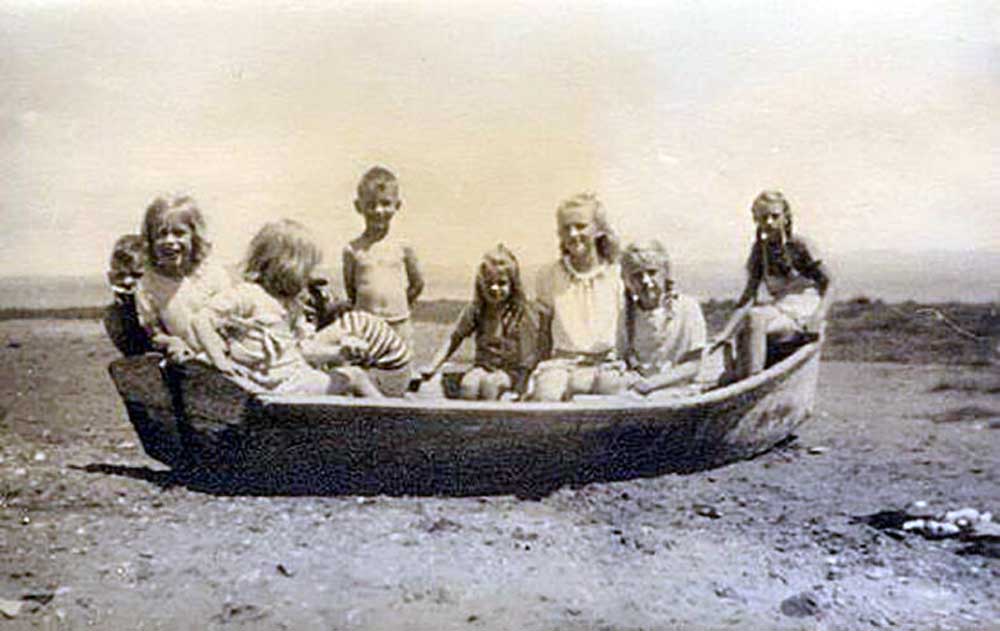Elementary, my dear… ‘Tide’s out! Table’s set!’ Historic peninsula watchwords!
Published 7:13 am Monday, October 3, 2022

- All in the same boat: In the summer of 1943, a group of Oysterville friends and neighbors took advantage of an empty skiff at water’s edge to have their picture taken. From l to r: Danny Kemmer, Freddy Espy, ?, ?, Jimmy Kemmer, Sydney Little, Anne Cannon, July Heckes, Nancy Cannon.
I was two years old when my friend Memi Sherwood arrived in Oysterville with her family in 1938. As a matter of fact, I hadn’t yet arrived, myself. I was still in Boston with my folks when Memi (whose real name was Ann and who was a whole three years older than I) moved here from Joplin, Missouri.
Trending
They joined their grandparents, “Grandma and Grandpa Biggs” who had found their way here after the lead mine in Joplin had closed down. And there were a great many of them — sisters and brothers, uncles and aunts, cousins and friends. They had all come by a long and circuitous route — through the orchards and farms of California and Oregon and, finally, to the Long Beach Peninsula and Oysterville.
As for being rich or being poor, I don’t remember giving much thought to those ideas. And, I guess that since almost everyone we knew was very careful with those “hard-to-come-by” nickels and dimes. I figured we were all in the same boat when it came to money.
I don’t know if they were already being called “Victims of the Dust Bowl” or if that phrase came later. All I remember is that there were a lot more kids to play with in Oysterville! And as my mother and her siblings remembered about their own childhood, I thought we were all rich — but a special kind of rich. The kind without any money.
In the years that followed, other families arrived — often a mother and kids who were staying with relatives while dad was off to war. Or, “families down on their luck” hoping to get a fresh start. There were jobs in the canneries and on the oyster beds for those willing to work hard and, as I remember, everyone had a garden. Cash money was often scarce, but there was no shame in bartering,
‘Not exactly enjoying ourselves’
As my grandmother wrote to my Uncle Willard during those years (subsequently referred to as “the lean years”): We are far from in need, but are not exactly enjoying ourselves… We are doing a lot of old time bartering these days and it works fine. We have traded oysters for apples, cabbages, rutabagas etc. and now have exchanged some old lumber for potatoes.
And, always, the watchword was, “When the tide’s out, the table’s set. I don’t remember much about razor clam limits during those days. Were there seasons? Did we need a license? Mostly, my family’s focus was on the bounty of the bay as that’s the side of the Peninsula we lived on. My grandfather had oyster beds and he often went out and picked a mess for dinner — to the point that in later years, not many in our family considered oysters a delicacy. Sometimes we’d go out for mud clams, though, — “the very best kind for chowder,” Granny always said.
Granted, I was young during Dust Bowl times and World War II. Everyone I knew had a place to live, maybe not too fancy but, from a kid’s point of view, always warm and welcoming. I never heard of anyone “living in the woods” except old Jimmy Anderson and he had a house — more like a shack — and everyone in Oysterville kept an eye on him. If he didn’t walk into town for his daily purchase of “fresh” canned milk, one of the women sent their husband to check up on him.
And then there were a few houses, nice ones, belonging to old-time families who used to “remove to the beach” for the summer months to get away from the terrible heat of Portland and the inland valleys. There were a number in Seaview but the only owners we knew were Miss Dorothy Elliott’s parents clear from Walla Walla. Miss Elliot owned Camp Sherwood Forest for boys out near the Point and later moved it close to Nahcotta, nearer to her girls’ place, Camp Willapa. One of the years I was a camper, she took a group of us to her family home on our way to Beard’s Hollow for an overnight trip. I’ve never forgotten how awed I was to be in “The Elliott Place” as my grandparents called it.
Second homes
There’s a part of me, of course that’s still stuck back in “the day.” I have trouble coming to grips with the current concerns about homelessness and low-cost housing options and people who are more than willing to work but who can’t find affordable accommodations. And I don’t have to go far from home to see dozens and dozens of “second homes” which are empty a good part of each year.
As for being rich or being poor, I don’t remember giving much thought to those ideas. And, I guess that since almost everyone we knew was very careful with those “hard-to-come-by” nickels and dimes. I figured we were all in the same boat when it came to money. Except maybe the family that lived just south of the church for a time.
They had a passel of kids and none of them, except the parents, owned a pair of shoes. But even so, they included us all when, on payday, the mom brought a big loaf of sliced white bread (not the brown, thick-crusted loaves our moms baked) and a big jar of peanut butter and everybody got a sandwich. Everybody. “No one that plays over in our yard is ever going to go hungry,” she would say!
Years and years have gone by now. And, somehow, they’ve taken some of the warmth and gentleness with them. I miss those times. I wonder if there will ever be a way to get them back. And even more, I wonder what memories the five and six-year-olds of today will carry with them.









